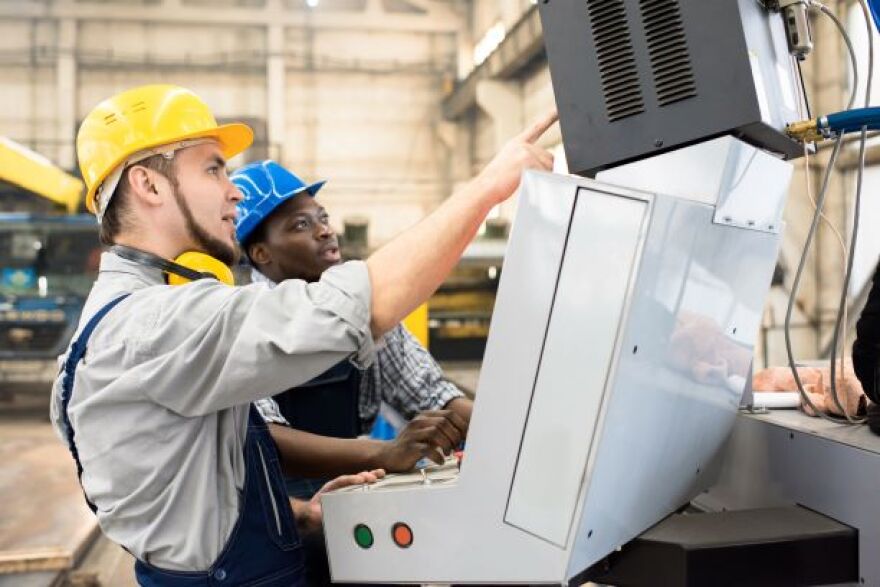With national unemployment rates the lowest they’ve been in nearly half a century, many employers can’t find enough skilled workers. In Connecticut, manufacturers are especially feeling the pinch. The state Department of Labor estimates the industry will need to hire tens of thousands of qualified workers in the next five years.
Now the state is expanding a free, short-term training program that helps people upgrade their skills and apply for good-paying jobs in manufacturing.
29-year old Shawn Dulac said as a teen he dropped out of high school and got a job in food service. “Then me and my fiancé got together in 2016 and we wanted something more than just getting by, living in an apartment,” he said. “So we decided to purchase a house. Upon closing on our house, we realized that she was pregnant. And little after, unfortunately I lost my job and became unemployed.”
A friend told him about the large number of manufacturing jobs open in eastern Connecticut.
“And so I was like, that’s great. I’m a big hobbyist. I’m into blacksmithing. I enjoy working with my hands. I’d be interested in being a machinist.”
He got his GED and was accepted into a short-term ‘Intro to Manufacturing’ course. The course was created through the Eastern Connecticut Manufacturing Pipeline Initiative - a federally funded project that came together originally to address a severe shortage of workers at Groton shipyard Electric Boat.
“It started off with basic math,” he said, “..kind of like algebra, and it started going into trigonometry. I thought it was great. They realized that everybody had an individual learning style. Nobody got left behind.”
And it worked. Dulac was hired as a sheet manifold technician at aerospace parts manufacturer Whitcraft in Eastford, Connecticut. He’s since been promoted and now inspects engine parts.
Now that successful model in Eastern Connecticut is set to go statewide.
Bill Villano is the CEO of Workforce Alliance in New Haven, which is about to launch its own five-week training program. “It’s a really new paradigm,” said Villano. “It’s a new dynamic in that it’s a short term training that gives people the basics and then they get the balance of the training on the job.” Villano said the classes are for under-employed and unemployed people who are willing to commit. If applicants’ math skills come up a little short for example, there’s a two-week remedial class they can take.
The model works well he said, because employers, educators and labor all sat around a table together to design and tailor a curriculum to meet local needs. Villano explained that manufacturers were asked what was common to all of them. Then, educators created a program that would apply to most manufacturers. Workers get the more specific training on the job.
Rich DuPont of Housatonic Community College will be coordinating the effort in New Haven. He said Connecticut’s community colleges have manufacturing technology centers across the state that work well, but the training takes a lot longer. “This program offers students who might not be able to commit to ten months of their lives in a program like that, with a really genuine opportunity. Manufacturing is paying great wages and benefits right now,” said DuPont.
John Beauregard, CEO of the Eastern CT Workforce Investment Board, said the response in eastern Connecticut has been overwhelming.
“We were supposed to teach 30 classes, we ended up teaching 45,” he said. “And we were supposed enroll in training 450. We enrolled 718. And we were supposed to get 400 job placements and we just went over the 1200 mark.”
More than three quarters of those now employed had no prior manufacturing experience.
Shawn Dulac described it this way. “I went from a single parent, not being able to afford anything, sleeping on a floor, to owning my own home and having this opportunity to work at Whitcraft. It’s a great sense of accomplishment and it brings me a lot of pride considering where I’ve come from.”
New Haven’s program – called Skill Up For Manufacturing – will be funded with both federal and state monies. In addition to free classes there’s travel reimbursement and daycare assistance for participants, as well as a cash stipend for successfully completing benchmarks along the way.
This story is part of American Graduate: Getting to Work, a public media initiative made possible by the Corporation for Public Broadcasting. More at cptv.org/makingthefuture


